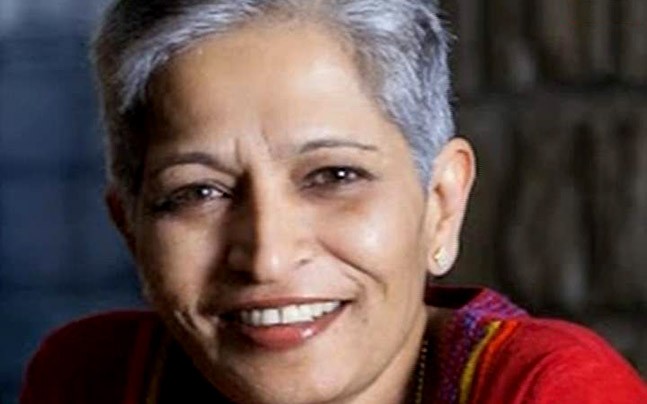BENGALURU, India (Reuters) – Indian journalists and rights activists protested on Wednesday against the murder of an outspoken publisher of a weekly tabloid amid growing concerns about freedom of the press at a time of rising nationalism and intolerance of dissent.
Gauri Lankesh, 55, the editor and publisher of the Kannada-language “Gauri Lankesh Patrike” newspaper, was shot dead on Tuesday by unidentified assailants near her home in the southern city of Bengaluru.
She had parked her car outside her gate and was walking to the main entrance of her home when the attackers fired at least seven rounds, killing her, police said.
Lankesh was a fierce advocate of secularism and opposed hardline Hindu groups associated with Prime Narendra Modi’s right-wing, nationalist ruling party.
Her weekly, with a circulation of more than 5,000, is regarded as influential in the state, read by policy makers and politicians.
Lankesh spent decades with various media outlets before taking over the newspaper started by her father.
Several journalist groups, including the Editors’ Guild, Press Club of India and Press Association, held protests in cities across India, calling her murder a “brutal assault on the freedom of the press”.
They said she was a critical, secular voice at a time when the country was being swept by a wave of right-wing, Hindu nationalism.
“She was an idealist and would take on the right-wing forces on several controversial issues,” said Y.P. Rajesh, an executive editor at the news website The Print and a long-time friend of Lankesh.
The U.S. embassy in New Delhi also condemned the killing.
The murder is a new low in India’s recent record of protecting journalists.
The Committee to Protect Journalists has said that there have been no convictions in any of the 27 cases of journalists murdered in India because of their work since 1992.
This year, the country of 1.3 billion people slipped three places to 136th in the World Press Freedom Index, compiled by Reporters Without Borders.
The group said Hindu nationalists, on the rise since the Bharatiya Janata Party (BJP) swept to power in 2014, were “trying to purge all manifestations of anti-national thought”.
Journalists seen to be critical of Hindu nationalists are often insulted on social media, and some women reporters have been threatened with assault.
People, including BJP members, have also openly insulted journalists, using terms like “presstitute” – a combination press and prostitute – to berate them.
In recent weeks, Lankesh had posted videos on her Facebook page that were critical of Modi’s economic policies and the rise of hardline Hindu groups since he came to power.
Last year, she was sentenced to six months in jail after a defamation case was filed by a BJP member. She was released on bail.
Ananth Kumar, a federal minister in the Modi government, said the state government must arrest those behind the killing.
The state government in Karnataka, run by the Congress party, said it had set up a special investigations team to investigate and police were examining CCTV footage.
M.N. Anucheth, a senior police official investigating the case, said Lankesh was shot in the head, neck and chest.
“This is an attempt to silence all of us — all of those who believe in democracy and decency,” Ramchandra Guha, a historian told the Indian Express newspaper.
Additional reporting and writing by Rupam Jain, editing by
